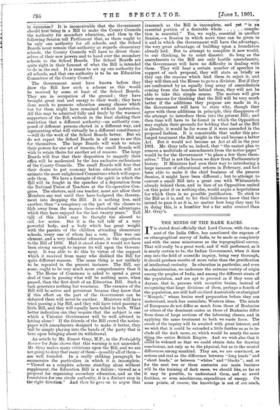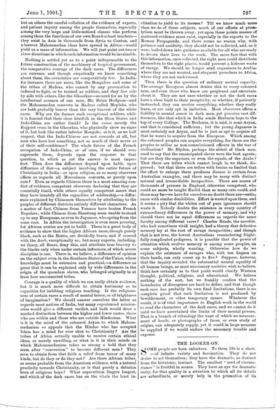THE MINDS OF THE DARK RACES.
IT is stated demi-officially that Lord Curzon, with the con. sent of the India Office, has sanctioned the expense of an ethnographical survey of India, to be made as completely and with the same minuteness as the topographical survey. That will really be a great work, and if well performed, as it is nearly certain to be, the Indian Government, when it does step into the field of scientific inquiry, being very thorough, it'should produce results of more value than the gratification of intellectual curiosity. In education in particular, and even in administration, we underrate the extreme variety of origin among the peoples of India, and among the different strata of the population, and are apt to proceed as if they were all Aryans, that is, persons with receptive brains, instead of recognising that large divisions of them, perhaps a fourth of the population, are still half-civilised Australoids or aboriginal "Mongols," whose brains need preparation before they can understand, much less assimilate, Western ideas. The minds of Europeans do not differ so much from those of Brahmins or others of the dominant castes as those of Brahmins differ from those of large sections of the labouring classes, and in applying the same treatment to both we waste force. The result of the inquiry will be awaited with great interest, and we wish that it could be extended a little further so as to in- clude all the dark races, or, which would be nearly the same thing, the entire British Empire. And we wish also that it could be widened so that we could obtain data for drawing conclusions, not only as to the physical, but as to the mental differences among mankind. They are, we are convinced, as serious and real as the difference between "long heads" and "short heads," or between " whites " and " blacks " ; and. as for the next two or three centuries our main business will be the training of dark races, we should like, so far as it may be possible, to understand them, and so avoid fruitless, or even mischievous, expenditure of energy. On some points, of course, the knowledge is out of our reach,
but on others the careful collation of the evidence of experts, and patient inquiry among the people themselves, especially among the very large and little-noticed classes who perform among them the functions of our own Board-school teachers— they exist in Asia in thousands from Syria to Canton, and wherever Mahommedan ideas have spread in Africa—would yield us a mass of information. We will just point out two or three directions in which such information would be invaluable.
Nothing is settled yet as to a point indispensable to the future" construction of the machinery of tropical government, the comparative courage of the dark races. The differences are extreme, and though empirically we know something about them, the certainties are comparatively few. In India, for instance, there are races, like the Bengalees and some of the tribes of Madras, who cannot by any provocation be induced to fight, or be trained as soldiers, and they live side by side with others, like the Ghoorkas—secured for ,us by the intellectual acumen of one man, Mr. Brian Hodgson—and the 3fahommedan converts in Madras called Moplahs, who are both probably braver than the very bravest of the white races. Why are the former such exceptional soldiers, while it is fancied that their close kinsfolk in the Shan States and Indo-China are rather timid? Is the cause merely the Rajpoot cross in the Ghoorkas, who physically show no signs of it, but look like rather inferior Mongols; or is it, as we half suspect, that the Indo-Chinese are not cowards at all, but men who have lost something, not so much of their nerve as of their self-confidence? The whole future of the French occupation of Judo-China, or of ours, if we should ever supersede them, depends upon the response to that question, to which as yet the answer is most imper- fect. • Then does the difference depend upon habit, upon difference of diet—a subject involving the entire future of Christianity in India—or upon religion, as so many observers affirm as regards all Mussulman converts, or purely upon race? Even as regards Chinese there is a most amazing con- flict of evidence, competent observers declaring that they are essentially timid, while others equally competent assert that they have innately all the capacities of soldiership,—a differ- ence explained by Chinamen themselves by attributing to the peoples of different districts entirely different characters. As a matter of fact, Chinese from Yunnan have beaten French Regulars ; while Chinese from Shantung seem unable to stand up to any Europeans, or even to Japanese, who spring from the same race. In Africa the investigation is even more pressing, for African armies are yet to build. There is a great body of evidence to show that the higher African races, though purely black, such as the Bantu, are decidedly brave, and if crossed with the Arab, exceptionally so; but many experts, including, we fancy, all Boers, deny this, and attribute true bravery to the blacks only when under certain influences, of which severe discipline is one. There is, we believe, a difference of opinion on the subject even in the Southern States of the Union, where knowledge must be extensive and practical,—a difference so great that it can be explained only by wide differences in the origin of the quondam slaves, who belonged originally to at least four unconnected tribes.
Courage is a quality of which we can easily obtain evidence, but it is much more difficult to obtain testimony as to capacities for imbibing religious teaching. Is the religious- ness of certain races a result of mental terror, or of brightness of imagination? We should answer ourselves the latter as regards most natives of India, but many experienced mission- aries would give a different verdict, and both would draw a marked distinction between the higher and lower castes, those who are within and those who are outside Hindooism. What is it in the mind of the coloured Aryan to which Mahom- medanism so appeals that the Hindoo who has accepted Islam has a mind for ever shut to Christianity? Are the tribes of Africa actually unable to receive certain ethical ideas, or merely unwilling, or what is it in their minds on which Mahommedanism takes so strong a hold that they seem after "conversion" to become different men ? They seem to obtain from that faith a relief from terror of many kinds, but do they or do they not? Are there African tribes, as seems probable from the American evidence, with a natural proclivity towards Christianity, or is that purely a delusion born of religious hope ? What superstition lingers longest, and which of the dark races has on the whole the least in- clination to yield to its terrors ? Till we know much more than we do of these subjects, much of our efforts at prose- lytism must be thrown away; yet upon these points masses of scattered evidence must exist, especially in the reports to the Roman Propaganda, and there seems no reason why,. with patience and assiduity, they should not be collected, and, as.it were, boiled down into guidance available for all who are ready to devote their lives to the work. The mere fact that with this information, once collected, the right men could distribute themselves to the right places, would prevent a hideous waste of energy. We should no longer send organisers to Arabia. where they are not wanted, and eloquent 'preachers to Africa, where they are not understood.
Then there is the question of ordinary mental capacity. The average European 'almost denies this to every coloured man, and even those who know are perplexed and uncertain about it. They are not sure whether or not the dark races have a close limit to their receptivity, or whether,-if patiently instructed, they can receive everything, whether they really learn, or are only apt in imitation. Most observers affirm a liability to mental arrest in dark men, yet perceive vast dif- ferences, like that which in India sends Brahmin boys to the top of every College. The •Brahmin, it is said, is semi-Aryan, and that is considered sufficient; but the young Japanese is most certainly not Aryan, and he is just as apt to acquire all that he wants to acquire from the European. Which among the coloured peoples can acquire everything, for those are the peoples to utilise as non-commissioned officers in the war of civilisation? Mr. Blyden, perhaps the ablest of black men, used to say that the emancipated slaves were the best agents; but are they the superiors, or even the equals, of the Arabs ? That there are tribes which cannot laugh is, we think, dis- proved; but that there are tribes with brains so limited that the effort to enlarge them produces disease is certain from Australian examples, and there may be many with distinct natural and irremediable incapacities. There are scores of thousands of persons in England, otherwise competent, who could no more be taught Euclid than so many cats could, and there may be—we have for ourselves no doubt there are—entire races with similar disabilities. Effort is wasted upon them, and it seems a pity that the whites out of pure ignorance should waste it. Nobody doubts the existence in every cotintry of extraordinary differences in the power of memory, and why should there not be equal differences as regards the same faculty among different races ? Charles Reade, the novelist. who had sometimes vivid insight, had a theory that defective memory lay at the root of savage incapacities ; and though that is not true, the lowest Australians remembering fright- fully complicated pedigrees, it is possible that, the power of attention which evolves memory is among some peoples, on some subjects, wholly wanting. Otherwise how do :we explain the existence of savages who, with ten fingers on their hands, can only count up to five ? Suppose, however, that the inquiry revealed the substantial mental equality of all human beings, as most missionary societies wish to believe, think how certainty as to that point would clarify *eatern thought, political, religious, and educational. We believe nothing of the sort, but we frankly confess that the boundaries of divergence are hard to define, and that though each race has probably its own final limitations, there is no complete proof that such limitation is not produced by bewilderment, or other temporary causes. Whatever the result, it is of vital importance to English work in the world to read the characters of the dark races, and we cannot do it until we have ascertained the limits of their mental powers. That is a branch of ethnology the want of which no measure- ment of heads, or photographs of faces, or even study of origins, can adequately, supply, yet it could in large measure be supplied if we would endure the necessary trouble and expense.







































 Previous page
Previous page